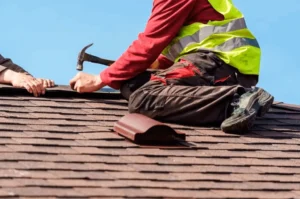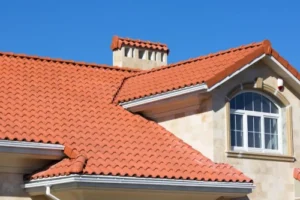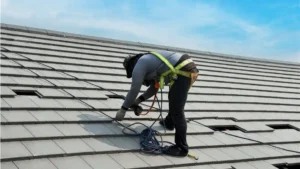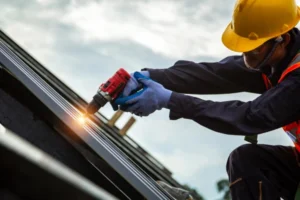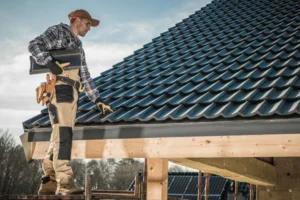Protect your Houston home: DIY or professional roof inspection? Know the pros and cons.
Houston Homeowners Face a Choice: DIY or Professional Roof Inspection?
Your roof is your home’s primary defense against the elements, especially here in Houston where we experience everything from scorching sun to torrential rain and the occasional hurricane threat. Regular roof inspections are a critical part of home maintenance, helping you catch problems early and prevent costly repairs down the road. But when it comes to roof inspections, Houston homeowners often wonder: can I do it myself (DIY), or should I hire a professional? Both options have their place, but understanding the risks, benefits, and limitations of each is crucial to making the right decision for your home and your safety. Let’s dive into the world of DIY vs. professional roof inspections in Houston, helping you determine the best approach for your specific situation.
The Allure of DIY: Why Homeowners Consider Self-Inspection
For many Houston homeowners, the DIY approach is appealing. Why pay someone else when you might be able to do it yourself and save some money? The initial appeal of DIY roof inspection often comes down to these factors:
- Cost Savings: The most obvious benefit – DIY inspection eliminates the cost of hiring a professional inspector.
- Convenience and Timing: You can inspect your roof on your own schedule, whenever it’s convenient for you, without needing to book an appointment.
- Familiarity with Your Home: As the homeowner, you’re intimately familiar with your house and might notice things a stranger wouldn’t.
- Sense of Control and Accomplishment: Some homeowners simply prefer to handle home maintenance tasks themselves and enjoy the feeling of self-reliance.
While these points are valid, it’s essential to weigh them against the potential downsides and limitations of DIY roof inspections, especially when it comes to something as critical as your roof’s health.
DIY Roof Inspection: Benefits, Steps, and Limitations
If you’re leaning towards a DIY roof inspection, it’s important to understand both the potential benefits *and* the significant limitations. A DIY approach can be useful for basic visual checks, but it’s rarely a substitute for a professional assessment.
Benefits of DIY Roof Inspection: A Limited Scope
DIY roof inspections do offer some limited benefits, primarily for very basic visual checks:
- Catching Obvious Issues from the Ground: You might be able to spot clearly missing or broken shingles, significant gutter clogs, or large debris on the roof from ground level (using binoculars).
- Identifying Interior Water Stains: DIY interior checks can reveal obvious water stains on ceilings or walls, indicating potential roof leaks (though not necessarily pinpointing the source).
- Basic Gutter Cleaning: Homeowners can often safely clean out gutters themselves, removing leaves and debris that can contribute to roof problems.
- Regular Visual Monitoring: DIY checks can encourage homeowners to pay more attention to their roof’s condition and become more aware of potential issues over time.
However, it’s crucial to understand that these DIY “benefits” are very limited and only scratch the surface of a comprehensive roof assessment.
Steps for a Basic DIY Roof Inspection (Safety First!)
If you choose to do a DIY roof inspection, prioritize safety above all else. *Never* go on your roof if you are uncomfortable with heights, if the roof is steep or slippery, or in wet or windy conditions. A basic DIY inspection should include:
- Ground-Level Visual Check (Always Start Here):
- Walk around your house and visually inspect the roof from the ground using binoculars.
- Look for: Missing, cracked, or broken shingles; curling or cupping shingles; uneven shingle lines; loose flashing; sagging roof lines; moss or algae growth; debris accumulation.
- Note any obvious damage or areas of concern you can see from the ground.
- Interior Check (Attic and Ceilings):
- Go into your attic with a flashlight (during daylight hours is best).
- Look for: Water stains, discoloration, or dampness on the underside of the roof decking or rafters; mold or mildew growth; daylight showing through the roof; inadequate insulation or ventilation issues.
- Inspect ceilings and walls in rooms below the roof for water stains, peeling paint, or sagging.
- Gutter Inspection and Cleaning (If Safe and Accessible):
- If you can safely access your gutters (using a sturdy ladder and proper safety precautions), inspect them for: Clogs and debris; rust or damage; loose attachments; improper slope.
- Clean out gutters if needed, removing leaves and debris (wear gloves).
- Document Your Findings (Notes and Photos):
- Take notes and photos of any issues you identify during your DIY inspection.
- This documentation can be helpful if you later decide to call a professional.
Safety Gear is Essential for DIY Gutter Cleaning: If you choose to clean gutters yourself, always use a sturdy ladder, wear work gloves, and consider safety glasses.
Limitations and Risks of DIY Roof Inspection: Where DIY Falls Short
While a DIY inspection might seem like a good starting point, it has significant limitations and risks, especially for Houston homeowners dealing with our challenging climate and potential for storm damage:
- Safety Hazards – Risk of Falls and Injury: Walking on roofs is dangerous, even for experienced professionals. Homeowners risk serious falls, especially on steep, high, or damaged roofs. DIY roof walking is strongly discouraged.
- Limited Expertise and Training: Homeowners lack the training and experience to identify subtle roof problems that a professional inspector would spot. DIY inspections often miss critical issues.
- Inability to Identify Hidden Damage: Many roof problems, like damage under shingles or flashing issues, are not visible to the untrained eye or from ground level. DIY inspections are surface-level only.
- Missing Critical Components: DIY inspections may overlook crucial roof components like flashing details, ventilation adequacy, or structural issues that require specialized knowledge to assess.
- Misdiagnosis and Ineffective “Repairs”: DIYers might misdiagnose problems and attempt incorrect or ineffective “repairs” that can actually worsen the situation.
- Liability Issues: If you injure yourself while attempting a DIY roof inspection, your homeowner’s insurance might not cover it if it’s deemed a risky or unnecessary activity.
- Voiding Warranties: Walking on your roof yourself might void roofing material warranties in some cases.
- Inadequate for Insurance Claims: DIY inspection reports are not accepted by insurance companies for damage claims. Insurance requires professional inspection reports.
DIY Inspections – Limited Value, Real Risks: DIY roof inspections are generally not recommended beyond basic ground-level visual checks and gutter cleaning due to safety risks and the high likelihood of missing critical issues.

DIY roof inspections are risky and often miss critical issues. Safety and expertise are paramount.
Professional Roof Inspection: Benefits, Process, and Costs
For a truly comprehensive and reliable assessment of your roof’s health, a professional roof inspection by a qualified Houston roofing company is the way to go. While it involves a cost, the benefits and peace of mind are well worth the investment.
Benefits of Professional Roof Inspection: Expertise and Thoroughness
Professional roof inspections offer significant advantages over DIY attempts:
- Safety and Expertise: Professional inspectors are trained and equipped to safely and thoroughly inspect roofs, even those that are steep, high, or complex.
- Comprehensive Assessment: Professionals conduct a much more detailed and comprehensive inspection, checking all roof components, including those not easily visible to homeowners.
- Identifying Hidden Damage: Experienced inspectors are trained to spot subtle signs of hidden damage, leaks, and potential problems that DIYers would likely miss.
- Accurate Diagnosis and Recommendations: Professionals can accurately diagnose roof issues and recommend the correct repairs or maintenance needed, preventing ineffective or unnecessary work.
- Insurance Claim Support: Professional inspection reports are accepted by insurance companies and are essential for filing roof damage claims.
- Extending Roof Lifespan: By catching and addressing minor issues early, professional inspections help extend the lifespan of your roof and prevent premature replacement.
- Maintaining Home Value: Regular professional inspections demonstrate proactive home maintenance, which helps maintain or even increase your home’s value.
- Peace of Mind: A professional inspection provides homeowners with accurate information about their roof’s condition and peace of mind knowing their roof is sound or that any issues are being properly addressed.
Professional Inspections = Expertise and Peace of Mind: For a thorough, safe, and reliable roof assessment, a professional inspection is the clear choice.
What a Professional Roof Inspection Includes: A Detailed Process
A professional roof inspection in Houston is a detailed process conducted by trained experts. Here’s what you can typically expect:
- Initial Consultation and Scheduling: You’ll contact a roofing company, discuss your needs, and schedule an inspection appointment at a convenient time.
- Exterior Roof Inspection (Hands-On and Visual): A trained inspector will physically access your roof (safely) and conduct a close-up visual inspection of all exterior components:
- Shingles/Roofing Material: Detailed examination for damage, wear, proper installation, and material condition.
- Flashing: Thorough check of flashing around all penetrations for damage, rust, sealant condition, and secure attachment.
- Vents: Inspection of all roof vents for obstructions, damage, and proper function.
- Chimney (if applicable): Assessment of chimney masonry, cap, and flashing.
- Gutters and Downspouts: Checking for damage, clogs, proper attachment, and drainage.
- Roof Structure (Visual Clues): Looking for signs of sagging or structural issues.
- Interior Attic Inspection: The inspector will enter your attic to assess:
- Roof Decking: Checking for water stains, damage, rot, or sagging from underneath.
- Insulation and Ventilation: Assessing insulation levels and ventilation effectiveness.
- Leak Evidence: Looking for any signs of active or past leaks, water damage, or mold growth.
- Documentation and Photography: The inspector will meticulously document all findings with notes and photographs of any issues or areas of concern.
- Detailed Report Generation: After the inspection, the roofing company will prepare a comprehensive written report outlining:
- Overall Roof Condition Assessment.
- Specific Issues Identified (with photos).
- Likely Causes of any Damage.
- Recommended Repairs or Maintenance.
- Prioritization of Recommended Actions.
- Estimated Lifespan of the Roof.
- Consultation and Explanation: A reputable company will review the report with you, explain the findings in detail, answer your questions, and discuss recommended solutions and repair options.
Professional Inspection Process = Thoroughness and Expertise: A professional roof inspection is a multi-point process conducted by trained experts, providing a detailed and reliable assessment of your roof’s condition.
Costs of Professional Roof Inspections in Houston: A Worthwhile Investment
Professional roof inspections do have a cost, but it’s an investment in preventing much larger expenses down the line. Typical costs for professional roof inspections in Houston vary depending on factors like:
- Roof Size and Complexity: Larger roofs and roofs with complex architecture will generally cost more to inspect.
- Type of Inspection: Routine inspections are usually less expensive than real estate inspections or detailed damage assessments.
- Company Reputation and Experience: More established and highly-rated roofing companies may charge slightly more, but often provide more reliable and thorough inspections.
- Report Detail: Inspections with very detailed reports, photos, and specialized services (like thermal imaging) might have a higher cost.
Typical Cost Ranges for Professional Roof Inspections in Houston:
| Type of Inspection | Typical Cost Range (Houston) |
|---|---|
| Routine Annual Inspection | $150 – $400 |
| Real Estate Inspection | $250 – $500+ |
| Damage-Specific Inspection | $200 – $450+ |
Get Quotes and Compare Value: Always get quotes from 2-3 reputable Houston roofing companies to compare inspection costs and the services included in their inspections. Focus on value and thoroughness, not just the lowest price.
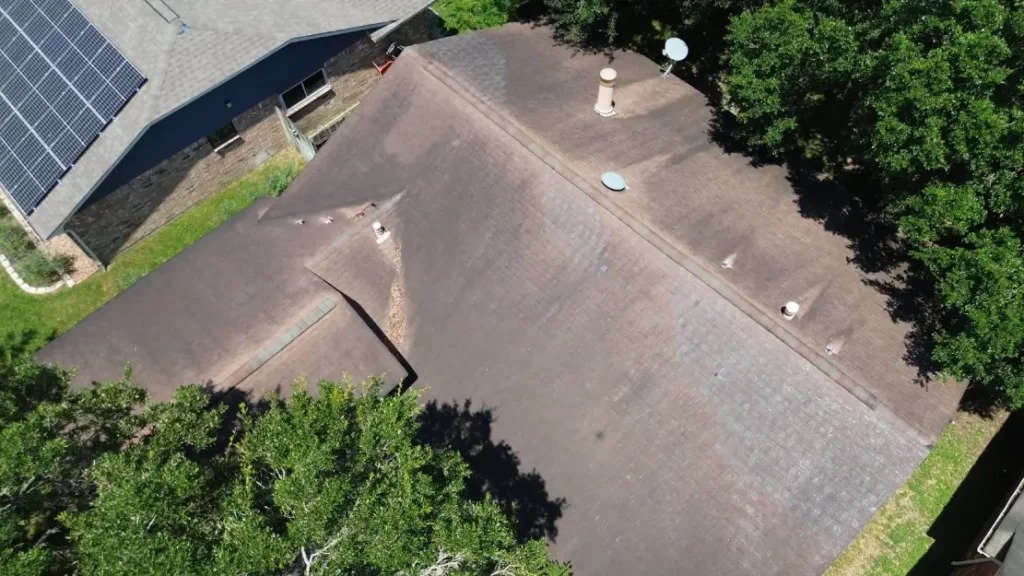
Professional roof inspections in Houston offer expertise, safety, and peace of mind – a valuable investment.
DIY vs. Professional Roof Inspection: Side-by-Side Comparison
To help you clearly see the differences, here’s a side-by-side comparison of DIY vs. Professional roof inspections in Houston:
| Feature | DIY Roof Inspection | Professional Roof Inspection |
|---|---|---|
| Safety | High risk of falls and injury, especially for untrained homeowners. | Inspectors are trained and equipped for safe roof access. |
| Expertise | Limited to homeowner’s knowledge; likely to miss subtle or hidden issues. | Conducted by trained roofing experts with in-depth knowledge. |
| Thoroughness | Basic visual check, primarily from ground level and limited attic check. | Comprehensive inspection of all roof components, interior and exterior. |
| Damage Detection | May identify obvious damage, but likely to miss hidden or subtle problems. | Accurately identifies both obvious and hidden damage, leaks, and potential issues. |
| Accuracy of Diagnosis | Homeowner may misdiagnose issues or be unable to determine the root cause. | Professional diagnosis of roof problems and their causes. |
| Repair Recommendations | DIYer may attempt ineffective or incorrect repairs. | Provides accurate and effective repair recommendations. |
| Insurance Claims | DIY inspection reports are not accepted for insurance claims. | Professional reports are essential for insurance claims. |
| Cost | Lower upfront cost (time investment instead). | Involves a professional inspection fee (but prevents larger future costs). |
| Time Commitment | Can be done relatively quickly for a basic visual check. | Takes longer for a thorough professional inspection. |
| Overall Value for Houston Homeowners | Limited value beyond basic visual monitoring; high risk of missing critical issues. | High value for accurate assessment, preventative maintenance, and peace of mind; protects home investment. |
Side-by-side comparison: DIY vs. Professional roof inspections in Houston. Professional inspections offer significantly more value and safety.
When DIY Might Be Okay (and When It’s Definitely Not)
Are there *any* situations where a DIY roof inspection might be acceptable for a Houston homeowner? And when is a professional inspection absolutely essential? Let’s clarify:
Situations Where DIY Inspection Might *Slightly* Suffice (Use Caution)
In very limited situations, a *basic* DIY visual check from the ground might be *a starting point*, but should *never* be considered a complete roof assessment:
- Very New Roof (Recently Installed): If your roof is brand new (installed within the last year or two) and you simply want to do occasional ground-level checks for obvious debris or damage after minor weather events. *Still get professional annual inspections.*
- Routine Gutter Cleaning: Homeowners can often safely clean gutters themselves as part of basic home maintenance, but this is not a roof inspection.
- Spotting Obvious Issues After Minor Events: If you notice a very obvious issue from the ground after a light rain or wind (like a large branch on the roof), a quick *ground-level* check might prompt you to call a professional sooner.
DIY Ground Checks = Very Limited Use: Even in these limited scenarios, DIY checks are *not* a substitute for professional inspections and should only be considered very basic visual monitoring from the ground.
Situations Where Professional Roof Inspection is ESSENTIAL (Always Recommended in Houston)
For Houston homeowners, professional roof inspections are highly recommended *at least annually* and are absolutely essential in these situations:
- Annual Routine Roof Maintenance: Schedule a professional roof inspection *every year* as part of your routine home maintenance, regardless of roof age.
- Before and After Hurricane Season: Get a professional inspection *before* hurricane season to prepare and *after* any hurricane or major storm to assess for damage.
- Real Estate Transactions (Buying or Selling): Always get a professional roof inspection when buying or selling a home.
- Suspect a Leak or Damage: If you notice any signs of a roof leak, water stains, or potential damage, call a professional roofer for an inspection immediately.
- Roof is Over 10-15 Years Old: Roofs age and deteriorate over time. Professional inspections become increasingly important as your roof ages.
- Before and After Major Roof Work: Get an inspection before major roof repairs or replacement to assess the scope of work needed, and after completion to ensure proper installation.
- Insurance Requirements: Some insurance companies may require regular professional roof inspections to maintain coverage, especially for older roofs or in high-risk areas like Houston.
Professional Inspections = Essential for Houston Homes: Given Houston’s climate and the importance of a sound roof, professional roof inspections are not optional – they are a necessary investment in protecting your home and family.
Risks of DIY Roof Inspection in Houston’s Climate: Storms and Heat
Houston’s specific climate and weather patterns make DIY roof inspections even riskier and less advisable:
- Hurricane Force Winds and Storm Damage: Houston is prone to hurricanes and severe storms that can cause subtle but significant roof damage that is easily missed by untrained DIY inspections. Professional post-storm inspections are crucial.
- Intense Heat and Sun Exposure: Houston’s extreme heat makes walking on roofs during much of the year dangerous and uncomfortable. Roof materials can become extremely hot, posing burn risks.
- Humidity and Algae Growth: Houston’s humidity promotes algae and moss growth on roofs, which can hide damage and make DIY visual inspections less effective. Professionals are trained to identify issues under these conditions.
- Sudden Downpours and Flash Flooding: Houston’s sudden heavy rains can make roofs slippery and dangerous very quickly. DIY inspections can be caught off guard by changing weather.
- Aging Roofs and Material Degradation: Houston’s climate accelerates roof aging. Professional inspections are needed to assess material degradation and subtle signs of wear that DIYers are unlikely to recognize.
Houston Climate = Professional Expertise Needed: The specific challenges of Houston’s weather amplify the risks of DIY roof inspections and underscore the need for professional expertise.
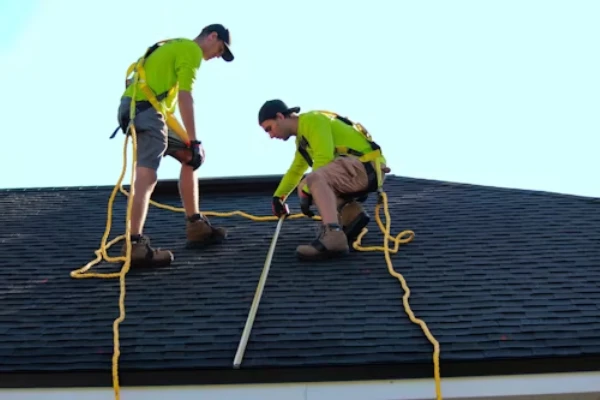
Houston’s climate demands professional roof expertise. DIY inspections are particularly risky here.
Finding a Reputable Professional Roofer in Houston for Inspections
Ready to schedule a professional roof inspection? Choosing the right Houston roofing company is key to getting a reliable and valuable assessment. Look for these qualities in a reputable roofer:
- Local Houston Company with Experience: Choose a company with a proven track record in the Houston area, familiar with local roof types and weather challenges.
- Licensed and Insured: Verify proper licensing and insurance (liability and workers’ compensation).
- Positive Reviews and Reputation: Check online reviews on Google, BBB, Yelp, etc. for customer feedback on inspections and service.
- Experienced and Certified Inspectors: Ask about the inspector’s experience and any certifications they hold (though specific “roof inspector” certifications are less common than general roofing certifications).
- Detailed Inspection Process and Reporting: Inquire about their inspection checklist and the type of report they provide (written report with photos is essential).
- Transparent Pricing for Inspections: Get a clear quote for the inspection fee upfront.
- No High-Pressure Sales Tactics: A reputable company will provide an honest assessment without pressuring you into unnecessary repairs or replacements during the inspection.
For trusted and professional roof inspection services in Houston, consider contacting Sunstar Roofing. They have a strong reputation for thorough inspections and reliable roofing services in the Houston area.
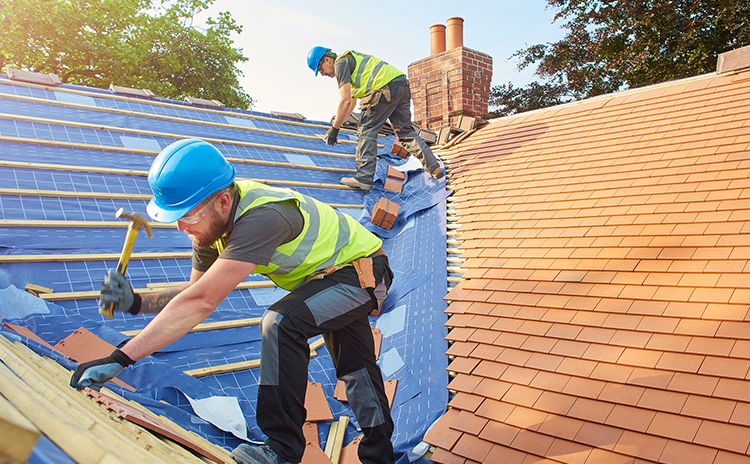
Choose a reputable, experienced Houston roofer for your professional roof inspections. Vetting is key.
Conclusion: Protect Your Houston Home – Choose Professional Roof Inspections
When it comes to roof inspections in Houston, the choice is clear: for the safety of yourself and the long-term health of your home, professional roof inspections are overwhelmingly the best option. While DIY visual checks might have a very limited role for basic monitoring, they simply cannot compare to the expertise, thoroughness, and safety of a professional assessment. Especially in Houston, with our challenging climate and vulnerability to storms, investing in annual professional roof inspections is not just smart – it’s essential for proactive homeownership and protecting your most valuable asset. Don’t risk your safety or your home’s integrity with DIY inspections. Contact a reputable Houston roofing company like Sunstar Roofing today to schedule your professional roof inspection and gain the peace of mind that comes with knowing your roof is in expert hands.

